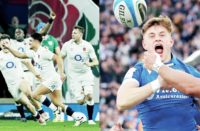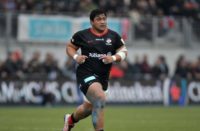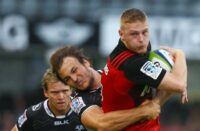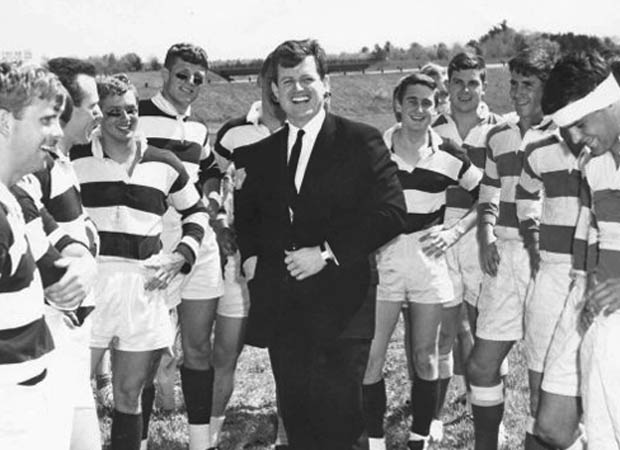 Politics and rugby make strange bedfellows. How a game of extreme physicality has managed to tickle the taste buds of such a disparate group of dictators, prime ministers, presidents and even Marxist revolutionaries is perhaps somewhat baffling. The fact that it is not the likes of former UK Prime Minister Gordon Brown and ex-President of France Jacques Chirac, from countries where the sport is mainstream, that dominate the list, but politicians and presidents from across the Pond, is also baffling.
Politics and rugby make strange bedfellows. How a game of extreme physicality has managed to tickle the taste buds of such a disparate group of dictators, prime ministers, presidents and even Marxist revolutionaries is perhaps somewhat baffling. The fact that it is not the likes of former UK Prime Minister Gordon Brown and ex-President of France Jacques Chirac, from countries where the sport is mainstream, that dominate the list, but politicians and presidents from across the Pond, is also baffling.
Even though it is a minority pastime in the land of gridiron, there are American political pundits who, to this day, believe one of the main reasons George W Bush defeated his Democrat opponent John Kerry in the 2004 Presidential election was down to Bush's prowess on the rugby field.
An exaggeration? Maybe. But during an at times bitter campaign, Bush made regular references to his experiences playing this ‘foreign' game at Yale.
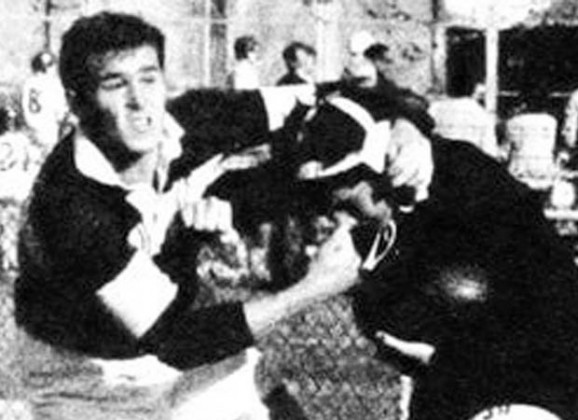
And when he squared off against fellow Yale alumni Kerry, a photo from Bush's rugby days appeared in the media, showing the President – a hard-working full-back – landing one on an opponent during the 1968 face-off with Harvard.
Even though several of his team-mates have gone on record saying that George W did not really stand out as a rugby player, many were happy to talk about his light-hearted confidence that helped considerably in Yale's winning run and unexpected victory over Harvard.
One of his colleagues of ‘68, Britt Kolar said: “What's interesting was that he was a good enough athlete that he could play a skill position in rugby with relatively little experience. He had running skills, tackling skills and especially kicking skills.”
Another colleague, Michael Bouscaren, explained that Bush was not a regular member of the Yale XV from day one, since it was composed mainly of international students familiar with the game. Then, during a mid-season encounter, fittingly against George Washington University, the future President came to the fore.
“A punt was sent down George's way,” Bouscaren remembered. “Head coach Jack Farman yelled, ‘One time, George, one time!' – in other words Catch It! The entire team watched, some nervously, as the ball passed over their heads because Bush had not yet proven himself.
“But sure enough, George caught it and came back with great speed and energy. That moment was one of the defining moments of his being accepted on the team as a real competitive individual.”
At 5ft 11ins, Bush was on the short side, but he made up for his comparative lack of height with extreme tenacity.
Coach Farman believed Bush never fully realised his potential at rugby.
“He wasn't serious about his rugby,” he said. “Had he been serious, he could've done better.”
Post-match booze-ups seem to have been right up the future President's street, according to another Yale ‘rugger', Charles Pillsbury: “When it was all over, the home team bought the beer. You drank beer with the other team and sang rugby songs – Bush was a wise-cracker then.”
Had the future ‘Leader of The Free World' displayed Presidential qualities all those years ago? Pillisbury said: “Are you kidding me? On that rugby team, I thought there were people who had more chance becoming President than him.”
The whole ‘Bush as a rugged rugby player' stunt proved to be an effective PR exercise, with the mainstream media discussing Bush's ‘punch' ad nauseam. Bloggers questioned Bush's sporting ethics, but once the hoo-ha had dissipated, even the most ardent Bush knocker admitted that the President's tough guy attitude on the pitch helped elevate his machismo rating.
This, during the first year of the second Iraq War and the continued ‘War on Terrorism', following 9/11, was what so much of America seemed to crave. Kerry was displayed as weak by the Bush spin doctors while their ‘man's man', would take no prisoners on the rugby field.
The other American politicians with a passion for rugby were all of the left, in the shapes of John Fitzgerald Kennedy, his brother Edward and Bill Clinton.
JFK was a useful forward at Harvard, often playing alongside his brother Joe, who was a real rugby nut.
Harvard sports trainer James Farrell reminisced fondly about Joe, who died aged 29 in World War Two.
“He loved to play rugby,” said Farrell. “Rugby was an informal sport played in the spring. Joe couldn't get on to the rugby field quick enough.”
From a very young age, Joseph Kennedy was groomed by his father to be the first Roman Catholic Irish-American President. When he was born, his grandfather John F Fitzgerald, then mayor of Boston, told reporters: “This child is the future President of the nation.”
Another rugby link in the Kennedy camp was chief of staff Ken O'Donnell, who had captained Harvard RFC, founded in 1872, and the oldest rugby club in North America.
There is no doubting the fact, however, that in rugby terms, JFK's younger brother, Ted, was a superior player.
A tough-guy type of tight-head prop, the future Senator was known to like to throw the odd punch or three. In fact, in one of Harvard's more notorious battles with the New York Club in the mid-50s, he carried his boxing skills just a bit too far, getting into three fights and being ordered off by the referee. After the game, he apologised.
According to the referee, Frederick Costick, Ted Kennedy was the only player he had ever expelled from a game in 30 years of officiating.
“Rugby is a character-building sport,” Costick told writer Jack Olsen for his book The Bridge at Chappaquiddick. “Players learn how to conduct themselves on the field with the idea that they will learn how to conduct themselves in life. When a player loses control of himself three times in a single afternoon, to my mind, that is a sign that, in a crisis, the man is not capable of thinking clearly and acting rationally. Such a man will panic under pressure.”
One future American political heavyweight, who had not held a rugby ball prior to his sojourn on a Rhodes scholarship to Oxford University in 1968, is Bill Clinton.
Much has been written about Clinton's two years amongst Oxford's dreaming spires. He smoked a few joints and demonstrated passionately against the Vietnam War, but apart from these two pre-requisites for any student in the Swinging 60s, he also took a fancy to rugby.
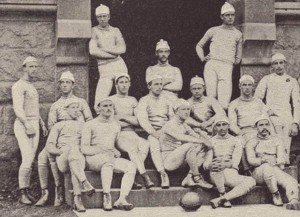
Many years later, the 42nd US President explained to the Australian media how it had come to pass:
“Being an American, I didn't really know the rules. But I was the biggest guy on our college team, so the coach just said to me: ‘Clinton, go out there and get in someone's way'. “So that's what I did, I just got in people's way!”
Described by his peers as “a rather lumpy but excellent second row forward”, he managed to become a more than proficient performer on the rugby field – not nearly good enough for a Blue, but a true convert nonetheless.
Another Democrat to embrace rugby well before the Clinton years was Woodrow Wilson. President from 1913-21, he was vilified in this country during the early years of the Great War for his overt “isolationism”, with the USA remaining neutral until 1917.
However, what he is less known for is his expertise as a rugby coach. In April 1877, a small band of Princetonians turned up in Cambridge, Massachusetts to pit themselves on the rugby field against Harvard. Fortunately for Princeton, among their number was a young man very familiar with “this English game”, and he was elected ‘Football Director'. His name was Woodrow Wilson, and despite his obvious talent as a coach, Harvard prevailed in the initial contest.
There are other political links with rugby, most notably one-time Republican Presidential hopeful and defeated Senator Pete Dawkins, who gained three Oxford Blues between 1959 and 1961, despite never having played the game prior to arriving in England. What was even more remarkable about this College All-American football star was that he introduced the torpedo throw to this country during the 1959 Varsity Match. Spectators watched aghast as his throw deliberately overshot his lineout jumpers to find his grateful skipper, the England centre Malcolm Phillips.
Let us leave the final words to Dawkins himself: “The sense of fraternity that exists amongst rugby people is unique in the world of sport.”
*This article was published in The Rugby Paper on July 20


